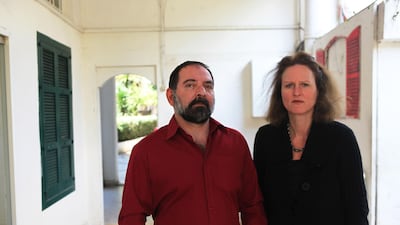Prominent Lebanese publisher and political activist Lokman Slim was this week found shot dead in a car in south Lebanon.
While the murder has put Slim's political rhetoric and the recent death threats he had received in the spotlight, the news has also overshadowed an important aspect of the activist's life.
Lokman was a documentary filmmaker and, much like his commentary, his work was politically focused. His films centred on themes of civil violence and looked at the collective memory of the Lebanese Civil War.
Along with his wife Monika Borgmann, Slim co-directed two award-winning films – Massaker in 2005 and Tadmor in 2016.
Massaker, a chilling documentary that marked Lokman's first feature, comprises the tales of six unidentifiable men who speak of the crimes they committed during the massacre that took place in the Sabra and Shatila refugee camps in 1982.
The documentary poses the unanswered questions of what drives people to commit such heinous crimes and how people are able to move on with their lives following such tragedy.
The film screened at international film festivals and received a number of awards, including the Fipresci Prize at the Berlin International Film Festival.
Tadmor, which is the Arabic word for Palmyra, is also where one of the Syrian regime's most infamous prisons was located.
The film Tadmor features a group of former Lebanese detainees who spent time in there, and who recount for the first time what happened to them during their imprisonment.
They not only testify publicly about the systematic torture and humiliation they experienced, but also rebuild Tadmor in an abandoned school near Beirut. According to the directors, by allowing the subjects to play the role of both victim and victimiser, they relive their survival.
The film won the Political Film Award at the Hamburg Film Festival in 2016 and two awards at the Nyon Visions du Reel Award the same year.
Slim and Borgmann have not only worked on documentaries together. In 2004, they co-founded non-governmental organisation Umam Documentation and Research, which focuses on the collection and preservation of materials that are related to Lebanese history, particularly focused on the Lebanese Civil War.
Umam also runs a cultural centre called The Hangar, which holds arts exhibitions, film screenings and talks.


